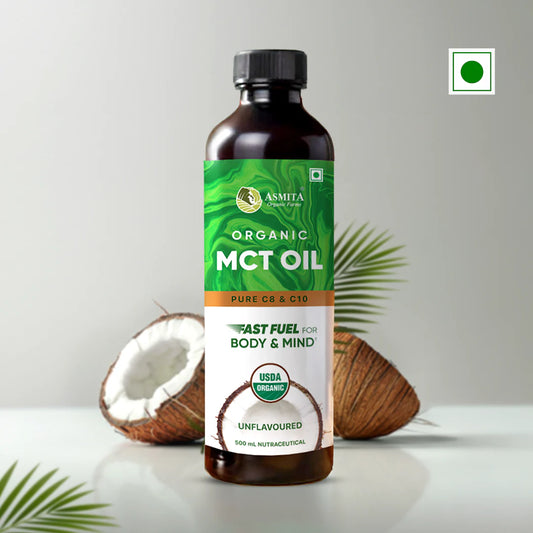MCT Oil vs. Coconut Oil: What’s the Difference?
5 min read
Table of Contents
- Nutrition Content: MCT Oil Versus Coconut Oil
- Unique Features of MCT Oil as Compared With Coconut Oil
- Benefits of MCT Oil and Coconut Oil
- MCT Oil and Coconut Oil: Key Difference
- Bottom Line
- FAQs
Nutrition Content: MCT Oil Versus Coconut Oil
Unique Features of MCT Oil as Compared With Coconut Oil
- Purity and Concentration: MCT oil displays a distinct characteristic through its highly concentrated medium-chain triglycerides that primarily consist of both C8 and C10 acids, which enable fast body absorption and energy conversion. The refinement process of MCT oil removes almost all lauric acid (C12) from the oil, resulting in an efficient fuel source that rapidly produces ketones for the body.
- Digestibility: MCT oil is easily digested and provides a quick source of energy. Its shorter chain length allows it to bypass the usual digestive process and go directly to the liver, where it is rapidly converted into energy or ketones, making it especially beneficial for those following ketogenic diets. In contrast, coconut oil is digested more slowly, resulting in a delayed energy release.
- Flavourless and Odourless: MCT oil lacks flavour or odour, which enables users to mix it easily with drinks, including coffee, smoothies and pre-workout shakes, without changing their taste profile, although coconut oil frequently produces coconut aromas. MCT oil remains liquid at standard room conditions, while coconut oil solidifies at or below 77°F (25°C), thus allowing MCT oil more flexibility as a dietary supplement instead of being utilised as cooking fat.
Benefits of MCT Oil and Coconut Oil
Benefits of MCT Oil
- Quick Energy Boost: MCT oil passes through liver metabolism quickly to produce energy effectively, thus making it optimal for athletes and users of ketogenic diets who need rapid energy.
- Supports Ketosis: The body can create ketones more effectively due to MCT oil, which allows people following keto or low-carb diets to remain in a state of fat metabolism.
- Mental Clarity and Focus: The brain cell-fueling power of ketones present in medium chain triglycerides of caprylic acid (C8) may enhance mental performance.
- Weight Management: The consumption of MCT oil leads to increased satiation levels and delivers small metabolic increases when used correctly as part of a balanced nutritional plan.
- Gut Health: Natural antimicrobial compounds in MCTs possess properties that protect a healthy gut microbiome by eliminating dangerous bacteria.
Benefits of Coconut Oil
- Natural Source of Lauric Acid: The health benefits of Lauric acid in coconut oil extend to three dimensions as it has antimicrobial, antifungal and antiviral properties. It fights infections while protecting the immune system.
- Cooking-Friendly: The stability and high smoking point of coconut oil make it useful for baking, along with frying and sauteing procedures.
- Skin and Hair Care: People apply coconut oil to their skin for moisturisation and to control hair damage while using it to treat dry skin problems.
- Heart Health: Evidence suggests that coconut oil may help raise good cholesterol (HDL), but it should be consumed in moderation, as it can also increase bad cholesterol (LDL) levels.
- Anti-inflammatory Effects: The antioxidants combined with polyphenols present in coconut oil display anti-inflammatory properties in the human body.
MCT Oil and Coconut Oil: Key Difference
|
Attributes |
Coconut Oil |
MCT Oil |
|
Source |
Coconut oil is extracted from the meat (flesh) of mature coconuts. At AsmitA Organic Farms, our coconut oil is naturally extracted from the flesh of mature coconuts. |
MCT oil is primarily derived from coconut oil or palm kernel oil. |
|
Fatty Acid Content |
It is a natural oil consisting of a mix of medium-chain and long-chain fatty acids. Coconut oil consists mostly of lauric acid, together with small quantities of caprylic acid and capric acid. |
MCT Oil (Medium-Chain Triglyceride Oil) exists as a refined product derived mainly from medium-chain fatty acids, including caprylic acid (C8), capric acid (C10) and sometimes lauric acid (C12). |
|
Digestibility |
Coconut oil takes a bit longer to get digested. |
MCT oil enters the body rapidly to get quickly converted into energy. |
|
Health Use |
Coconut oil is primarily used for general wellness and antimicrobial properties. |
MCT oil is known for providing quick energy and supporting brain function. |
|
Taste |
A mild coconut flavour is there in cold-pressed coconut oil. |
MCT oil is tasteless and odourless, making it appropriate for versatile uses. |
Bottom Line
Coconut oil maintains its nature as a cooking ingredient, but MCT oil stands apart as an energy-boosting supplement formulated for enhancing exercise performance and body metabolism together with its cognitive health advantages.
FREQUENTLY ASKED QUESTIONS
1. Can MCT oil be used on skin and hair?
2. How much MCT oil can I incorporate into my daily diet?
3. Can I start using MCT oil and coconut oil in my diet simultaneously?
4. How should I store the MCT oil?
5. Are there any probable risks associated with the use of MCT or coconut oil?






